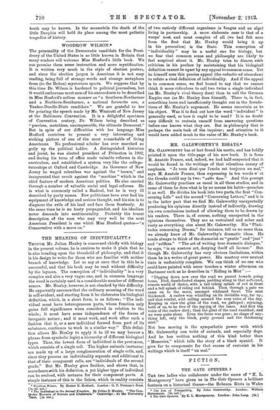MR. GALSWORTHY'S ESSAYS.*
Mn.. GALSWOBTHY has at last found his motto, and has boldly printed it upon the title-page of his new book. It is from
M. Anatole France, and, indeed, we had half-suspected that it would be found in the writings of that relentless enemy of
emphasis. " Je vous dirai que l'exces est tonjours nn mal," says M. Anatole France, thus expressing in ten words w at the Greeks could say in two: "'zany hay." And this precept Mr. Galsworthy practises as usual in all'these studies, and in some of them he does what is by no means his habit—preaches. it as well. He divides his book into two parts, the first " Con- cerning Life" and the second " Concerning Letters," and it is in the latter part that we find Mr. Galsworthy unexpectedly producing his opinions directly instead of indirectly, drawing his own conclusions instead of allowing them to be drawn by his readers. There is, of course, nothing unexpected in the opinions themselves. They are as restrained and sober and rusty as everything else about Mr. Galsworthy. His "Plati- tudes concerning Drama," for instance, tell us no more than we already knew of Mr. Galsworthy's dramatic ideas. He tends always to think of the dramatist as "gentle " and "just" and "selfless." " The art of writing true dramatic dialogue," he says, " is an austere art, denying itself all licence." But though Mr. Galsworthy has very obvious limitations, within them he is a writer of great power. His mastery over neutral tints is undeniably complete. We can think of no one wi:o could have painted with surer touches a winter afternoon on Dartmoor such as he describes in " Riding in Mist " :- "Dipping down now over the road we passed hounds going home. Pied, dumb-footed shapes, padding along in that soft-eyed, remote world of theirs, with a tall riding splash of red in front and a tall splash of riding red behind. Then through a gate we came on to the moor, amongst whitened furze. The mist thickened. A curlew was whistling bn its invisible way, far up ; and that wistful, wild calling seemed the- very voice of the day. Keeping in view the glint of the road, we galloped ; rejoicing., both of us, to be free of the jog-jog of the lanes. And first the voice of the curlew died ; then the glint of the road vanished; and we were quite alone. Even the furze was gone; no shape of any- thing left, only the black, peaty ground and the thickening mist."
Not less moving is the sympathetic power with which, Mr. Galsworthy can write of animals, and especially dogs. And he has written nothing of this kind better than " Memories," which tells the story of a black spaniel. It goes far to compensate for that excess of restraint in hie. writings which is itself " un mal."


























































 Previous page
Previous page